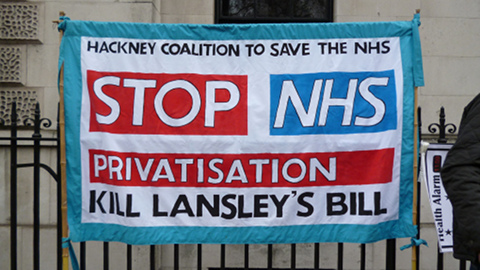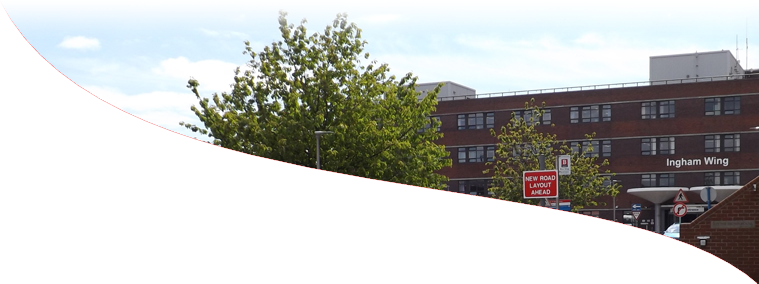
This Bill (a daft for legally binding act of parliament) was presented to parliament in 2010. It was given passage on 20th of March 2012 becoming the 2012 Health and Social Care Act . The Bill was based upon the white paper by then Health Secretary Andrew Lansley called Equity and Excellence: Liberating the NHS .
The Bill was drawn-up by corporate lawyers on behalf of the coalition government led by David Cameron and put through parliament shortly after they came to power in 2010 after promising unequivocally that they would halt the multiple top-down NHS reorganisations that had taken place up to that point:
In January 2011, the former contender for the Tory leadership Michael Portillo made a startling admission to the BBC's Andrew Neil. He let slip that in the run-up to the 2010 general election (after which the Tory - Lib-Dem coalition government was formed) the Tories had not been honest about their intentions towards the NHS. He said:
[The Tories] did not believe they could win a general election if they told you what they were going to do because people are so wedded to the NHS.
The Bill was four times as long as the legislation that set up the NHS, and most of the Bill amounted to obfuscation (as stated by Mark Britnell ). Amongst other things, this suggests that the Bill had been gestating for many years. At the heart of the Bill lay the biggest top-down free-market privatisation-orientated re-disorganisation of the NHS in its history.
Tony Blair gave the following advice (paraphrased) to the coalition government at the start of their term: 'Ram the Health and Social Care Bill home as quickly as possible, because the public will have forgotten about it by the time of the next general election'.
Central to the purpose of the Bill is the opening up of NHS contracts to Any Qualified Provider .
Andrew Lansley refused to publish the 'risk register' that looked at the potential dangers if the Bill passed. The Information Commissioner ruled that it was unjustified
to keep the register from MPs before they decided whether to support the huge Bill. However, there were enough MPs willing to support the Bill regardless. The 'risk register' was intended to remain secret, but it was leaked to commentators including Roy Lilley after the Bill completed its way through Parliament.
The bill was opposed by the large majority of GPs, shown by a survey undertaken by the Royal College of General Practitioners (RCGP).
Critics of the Bill
-
The British Medical Association said (in their typically understated way that slightly misses the point):
[The Bill is] complex, incoherent and not fir for purpose, and almost impossible to implement successfully, given widespread opposition across the NHS workforce. ...If passed the Bill will be irreversibly damaging to the NHS as a public service, converting it into a competitive marketplace that will widen health inequalities and be detrimental to patient care.
-
Richard Horton, Editor of 'The Lancet', the prestigious medical journal said:
People will die, thank to the Government's decision to focus on competition rather than quality in healthcare. The coming disaster puts even greater responsibility on us to overturn this disruptive legislation.
-
The Royal College of General Practitioners said:
[We are] concerned that the bill will cause irreparable damage to patient care and jeopardise the NHS. Three quarters of respondents to a poll carried out by the RCGP said that they thought it appropriate to seek the withdrawal of the Health and Social Care Bill.
-
The Royal College of Midwives said:
This bill is a massively expensive distraction from the challenges that the NHS faces in trying to improve healthcare at a time of severe spending restraint... We join the growing chorus of voices calling for the bill to be withdrawn, and the proposed reforms stopped in their entirety.
-
Max Pemberton, a junior doctor Writing about life on the NHS front-line said:
[The government is lying by their] flat denial that the Bill represented any sort of privatisation of the NHS, despite it being ovious to anyone who read it that this is precisely what it was.
- Dr Phil Hammond challenged Andrew Lansley saying that the Bill would create a disaster for genuine health care, for cooperation between medical professionals and for basic human compassion.
Throughout the 2-years that the bill was going through parliament campaigners and NHS staff were fighting desperately to stop it, by using petitions, lobbying and demonstrations including:
- A 'Drop the NHS Bill' protest on Mothers' Day in Parliament Square, London.
- A 'Drop the NHS Bill' protest by doctors.
- A 'Drop the NHS Bill' sit-down protest that blocked traffic in Whitehall, London.
- A 'Drop the NHS Bill' candle-lit vigil at St Thomas' Hospital, London.
If all this is news to you, that might have something to do with the fact that the BBC barely reported on it. On the day the Bill was passed, the BBC news tag-line read Bill which gives power to GPs passes
.
-
How to Dismantle the NHS in 10 Easy Steps - Dr Youssef El-Gingihy
Page: 51 -
NHS For Sale: Myths, Lies and Deception - Dr Jackie Davis et al.
Pages: 5, 128, 132, 250 -
Propaganda Blitz - How the Corporate Media Distort Reality
Pages: 157, 163


